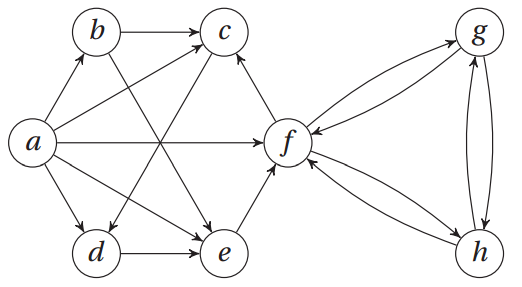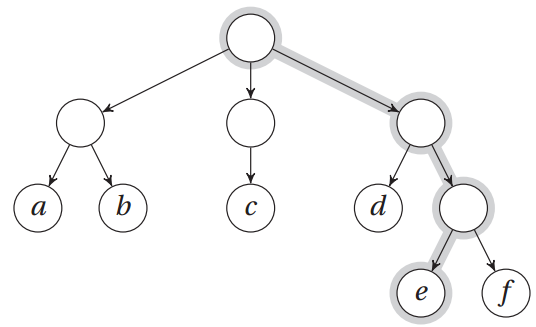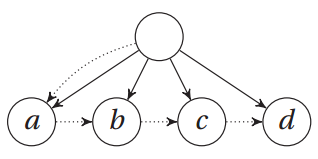【Python算法】圖與樹的實現
阿新 • • 發佈:2017-08-02
com 遍歷 alt self. als .com 字典 分享 def
鄰接列表及其類似結構
對於圖結構的實現來說,最直觀的方式之一就是使用鄰接列表。下面我們來實現一個最簡單的:假設現在我們有n個節點,編號分別為0,...,n-1。
然後,每個鄰接列表就是一個數字列表,我們可以將他們編入一個大小為n的主列表,並用節點編號對其進行索引。

鄰接集表示法:
a, b, c, d, e, f, g, h = range(8)
N = [
{b, c, d, e, f}, # a
{c, e}, # b
{d}, # c
{e}, # d
{f}, # e
{c, g, h}, # f
{f, h}, # g
{f, g} # h
]
鄰接列表
a, b, c, d, e, f, g, h = range(8) N = [ [b, c, d, e, f], # a [c, e], # b [d], # c [e], # d [f], # e [c, g, h], # f [f, h], # g [f, g] # h ]
加權鄰接字典
a, b, c, d, e, f, g, h = range(8)
N = [
{b:2, c:1, d:3, e:9, f:4}, # a
{c:4, e:3}, # b
{d:8}, # c
{e:7}, # d
{f:5}, # e
{c:2, g:2, h:2}, # f
{f:1, h:6}, # g
{f:9, g:8} # h
]
鄰接矩陣
嵌套 list 實現的鄰接矩陣
a, b, c, d, e, f, g, h = range(8)
# a b c d e f g h
N = [[0,1,1,1,1,1,0,0], # a
[0,0,1,0,1,0,0,0], # b
[0,0,0,1,0,0,0,0], # c
[0,0,0,0,1,0,0,0], # d
[0,0,0,0,0,1,0,0], # e
[0,0,1,0,0,0,1,1], # f
[0,0,0,0,0,1,0,1], # g
[0,0,0,0,0,1,1,0]] # h
由於圖上沒有自循環狀態,其對角線上的值應該全為假。
無向圖的鄰接矩陣應該是一個對稱矩陣。
我們通常會把不存在的邊的權值設置為無窮大。
inf = float(‘inf‘)
a, b, c, d, e, f, g, h = range(8) # a b c d e f g h N = [[inf, 1 , 1 , 1 , 1 , 1 ,inf,inf], # a [inf,inf, 1 ,inf, 1 ,inf,inf,inf], # b [inf,inf,inf, 1 ,inf,inf,inf,inf], # c [inf,inf,inf,inf, 1 ,inf,inf,inf], # d [inf,inf,inf,inf,inf, 1 ,inf,inf], # e [inf,inf, 1 ,inf,inf,inf, 1 , 1 ], # f [inf,inf,inf,inf,inf, 1 ,inf, 1 ], # g [inf,inf,inf,inf,inf, 1 , 1 ,inf]] # h
在鄰接矩陣中,查詢變(u,v)需要的時間為Θ(1),遍歷v鄰居的操作時間為Θ(n);
鄰接列表中,兩種操作所需的時間都為Θ(d(v))
我們應該根據圖的具體用處來選擇相關的表示法。
樹的實現

樹表示成一個二維列表
>>> T = [["a", "b"], ["c"], ["d", ["e", "f"]]] >>> T[0][1] ‘b‘ >>> T[2][1][0] ‘e‘
二叉樹類:
class Tree:
def __init__(self, left, right):
self.left = left
self.right = right
>>> t = Tree(Tree("a", "b"), Tree("c", "d"))
>>> t.right.left
‘c‘

多路搜索樹類:
class Tree:
def __init__(self, kids, next=None):
self.kids = self.val = kids
self.next = next
>>> t = Tree(Tree("a", Tree("b", Tree("c", Tree("d")))))
>>> t.kids.next.next.val
‘c‘
Bunch模式:
class Bunch(dict):
def __init__(self, *args, **kwds):
super(Bunch, self).__init__(*args, **kwds)
self.__dict__ = self
>>> T = Bunch
>>> t = T(left=T(left="a", right="b"), right=T(left="c"))
>>> t.left
{‘right‘: ‘b‘, ‘left‘: ‘a‘}
>>> t.left.right
‘b‘
>>> t[‘left‘][‘right‘]
‘b‘
>>> "left" in t.right
True
>>> "right" in t.right
False
【Python算法】圖與樹的實現
